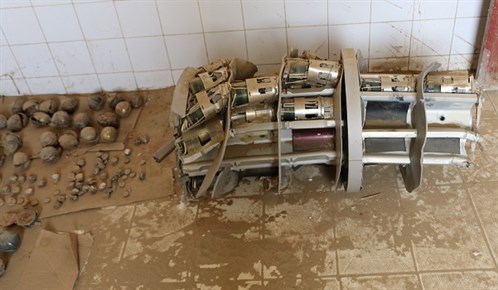13 June 2016
UK-Made Cluster Bombs Used in Yemen
Update 9 June 2016
In answer to Parliamentary questions, the UK Minister of Defence Procurement Philip Dunne and the UK Secretary of State for Defence Michael Fallon both claimed, despite clear evidence to the contrary, that no UK-supplied cluster munitions had been used in the current conflict in Yemen.
Amnesty International published a detailed additional briefing on research findings, sent a letter to the Secretary of State for Defence requesting clarification, and briefed the All-Party Parliamentary Human Rights Group. On 8 June, the House of Commons debated the issue of "Human Rights and Arms Sales to Saudi Arabia", including the evidence of use of cluster munitions.
The Cluster Munition Coalition calls on the United Kingdom to recognize that cluster munitions have been used in Yemen, including cluster munitions manufactured in the UK in the 1970s. The UK should condemn the use of cluster munitions. It must also explain the measures it is taking to "make its best efforts to discourage" the armed coalition led by Saudi Arabia from using cluster munitions, as required by Article 21 of the Convention on Cluster Munitions, to which the UK is a State Party.
****
Original post 23 May 2016
On 23 May 2016 Amnesty International released the findings of a recent mission to Yemen, confirming that cluster munitions made in the United Kingdom were used by the armed coalition led by Saudi Arabia.
The United Kingdom (UK) is a State Party to the 2008 Convention on Cluster Munitions. It produced, exported, imported, and used cluster munitions prior to joining the convention.
According to Amnesty International's press release: "coalition forces have used UK-manufactured BL-755 cluster munitions in Yemen. The BL-755 was manufactured by Hunting Engineering Ltd in the 1970s. This variant, designed to be dropped from the UK Tornado fighter jet, contains 147 submunitions designed to penetrate 250mm of armour while at the same time breaking into more than 2,000 fragments which act as an anti-personnel weapon. The weapon is known to be in the stockpiles of both Saudi Arabia and the United Arab Emirates."
"The human impact we currently see in Yemen of cluster munitions that were produced some 50 years ago underscores the importance of stockpile destruction, to prevent all future use of these indiscriminate weapons," said Megan Burke, Director of the Cluster Munition Coalition.
A BL-755 cluster munition identified in Yemen. Copyright Amnesty International
The weapon was located in Hayran, in a storage location where the Yemen Mine Action Center (YEMAC) stores unexploded ordnance it has collected. "Around a dozen bomblets were still inside in the crushed remains of the bomb casing and YEMAC had stored another 70 or so bomblets in the same facility indicating that 80 or so bomblets, more than half, failed to detonate," noted Amnesty International.
As reported by the Cluster Munition Monitor, cluster munitions produced by the UK before it joined the Convention on Cluster Munitions were exported to, or otherwise finally possessed by, some 21 states. Ten of those weapon-importing states have now renounced these indiscriminate weapons by joining the Convention on Cluster Munitions, but Saudi Arabia and the United Arab Emirates have not.
The UK has condemned recent instances of use of cluster munitions (such as in Ukraine, Sudan, and Syria among others), but has not commented publicly on the use of cluster munitions in Yemen. The Cluster Munition Coalition is concerned at a lack of consistency in the UK's approach to how states that are part of the Convention on Cluster Munitions collectively respond to new use of cluster munitions. At the First Review Conference of the Convention on Cluster Munitions in 2015, the UK was one of four states that expressed a reservation with the Dubrovnik Declaration that "condemn[ed] any use of cluster munitions by any actor."
The UK, as a State Party to the Convention on Cluster Munitions, has an obligation to "promote the norms it establishes" and to "discourage states not party … from using cluster munitions" (Article 21), including in Yemen.
The Cluster Munition Coalition has repeatedly called on the Saudi-led armed coalition to stop using cluster bombs. All states that form the armed coalition should join the Convention on Cluster Munitions.
Related news:
US Suspends Cluster Munitions Sales to Saudi Arabia, Cluster Munition Coalition, 1 June 2016
Stop Cluster Munition Use in Yemen, Cluster Munition Coalition, 23 March 2016
Yemen: Embargo Arms to Saudi Arabia, Human Rights Watch, 21 March 2016
Timeline of Cluster Munition Use in Yemen, Cluster Munition Coalition


